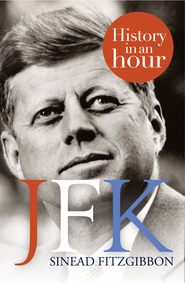
Полная версия:
JFK: History in an Hour

JFK
History in an Hour
Sinead Fitzgibbon
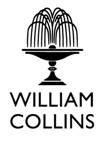
About History in an Hour
History in an Hour is a series of ebooks to help the reader learn the basic facts of a given subject area. Everything you need to know is presented in a straightforward narrative and in chronological order. No embedded links to divert your attention, nor a daunting book of 600 pages with a 35-page introduction. Just straight in, to the point, sixty minutes, done. Then, having absorbed the basics, you may feel inspired to explore further.
Give yourself sixty minutes and see what you can learn …
To find out more visit http://historyinanhour.com or follow us on Twitter: http://twitter.com/historyinanhour
Contents
Title Page
About History in an Hour
Introduction
From the Old World to the New
Early Life
War Service
Triumph to Tragedy
Passing the Baton
Political Beginnings
Onwards and Upwards
When Jack Met Jackie
A Small Setback
The Right Man for the Job?
Presidential Campaign
The Birth of Camelot
The Bay of Pigs
Space Wars
East vs West
‘Eyeball to Eyeball’
A Moral Crisis
Vietnam
Farewell to Camelot
Epilogue
Appendix 1: Key Players
Appendix 2: Timeline of JFK
Copyright
Got Another Hour?
About the Publisher
Introduction
Few in political history have enjoyed the kind of instant recognition afforded to John Fitzgerald Kennedy, America’s 35th President. Known simply as JFK, Kennedy’s good looks and easy charm was potently deployed through the newly influential medium of television. This meant that his journey to the White House captured the imagination of millions of people, both domestically and internationally.
For many, Kennedy’s inauguration heralded a bright new dawn for US politics. At just forty-three, he was the youngest man ever to be elected President; he was also the first Roman Catholic. With youth, charisma and widespread popularity on his side, the future seemed bright.
Unfortunately, he was denied the chance to live up to his early promise. Barely one thousand days into his presidency, which had been marred by civil unrest in the segregated South and the threat of nuclear war from the Soviet Union, Kennedy’s life was curtailed by an assassin’s bullet in Dallas, Texas, in 1963. The country’s youngest-ever elected president thus became the youngest to die – thereby immortalizing JFK as a tragic hero.
However, since his death, details have emerged of a private life at odds with his public persona. Rumours of serial adultery, hidden health problems, a secret marriage, and even drug addictions have since blurred his once pristine image.
This, in an hour, is the history of JFK.
From the Old World to the New
By the mid-twentieth-century, the Kennedy family was among the richest and most powerful in America. Just three generations previously, JFK’s paternal and maternal ancestors had endured lives of poverty in famine-stricken Ireland. Such was their deprivation that both of his great-grandfathers – Thomas Fitzgerald and Patrick Kennedy – were forced to abandon their impoverished country in search of a new and better life in the US State of Massachusetts.

John ‘Honey Fitz’ Fitzgerald
In their adoptive country, both families enjoyed success in business and eventually became involved in politics. Thomas Fitzgerald’s son – John Francis Fitzgerald, known as ‘Honey Fitz’ – was a member of both the US House of Representatives and the Massachusetts Senate, in addition to serving two terms as Boston’s first Irish–Catholic mayor. After making his fortune from whiskey importation and a successful foray into banking, Patrick Kennedy’s only son, PJ, also turned his mind to a career in public service. PJ Kennedy would eventually serve five years in the Massachusetts House of Representatives, as well as six years in the State Senate.
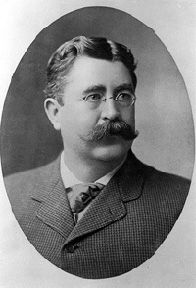
Patrick Joseph ‘PJ’ Kennedy
On 7 October 1914, after a seven-year courtship, Honey Fitz’s eldest daughter, Rose, married PJ Kennedy’s eldest son, Joseph, thus merging these two influential Irish–American clans.
Early Life
John Fitzgerald Kennedy
Born Brookline, Mass. (83 Beals Street) May 29, 1917
With these few simple words, handwritten on a notecard, Rose Kennedy recorded the birth of her second son – a handsome blue-eyed boy who, although named after his maternal grandfather, would become known as ‘Jack’.
The family’s fortunes had continued to improve in the three years since the Fitzgerald-Kennedy marriage. By the time of Jack’s birth, they lived a comfortable upper-middle-class life in the Boston suburb of Brookline. Over the years, Joe would successfully try his hand at a number of businesses, including stock market speculation, movie producing, and liquor importation. By 1927, the family had moved to the exclusive suburb of Riverdale, New York.
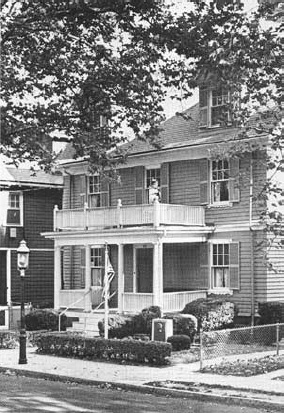
The Kennedy family home in Brookline
Despite the privileged circumstances of his birth, Jack was unlucky in his health. A sickly child, he suffered from numerous childhood illnesses, including whooping cough, chicken pox, and measles. And then, three months shy of his third birthday, Jack contracted a virulent strain of scarlet fever – a potentially deadly disease in these days prior to the discovery of penicillin. For a time, it appeared that Jack would succumb to the illness, but after a month in hospital, he began to recover. He would continue to struggle with ill-health for the rest of his life.
Despite spending much of his childhood confined to a hospital bed or cooped up in a sanatorium, Jack did manage to attend school. In 1931, after a brief and unhappy stint at the Catholic Canterbury High School, the fourteen-year-old boy enrolled at Choate, an exclusive Episcopalian boarding school in Connecticut.
At Choate, Jack excelled socially and, to a lesser extent, academically. He made friends easily, and despite being a disruptive influence in class, scored relatively well in tests. His schoolmasters, however, were exasperated by his unwillingness to take instruction, resulting in his near expulsion on at least one occasion.
Before leaving Choate in 1935 (graduating 65th out of his class of 110), Jack was interviewed by a school psychologist about his obstreperous behaviour. During this conversation, the seventeen-year-old Jack revealed, perhaps inadvertently, feelings of inadequacy: ‘If my brother were not so efficient, it would be easier for me to be efficient,’ he said, ‘he does it much better than I do.’
The brother referred to here is Joseph Junior, Jack’s elder brother. Sharing his father’s outlook and disposition, and being more robust than his sibling, Joe Jr had always been Joe Sr’s favoured son, thus bearing the weight of his family’s considerable expectations. In fact, not long after Joe Jr’s birth, Honey Fitz had declared (only slightly facetiously) that his parents had ‘already decided that he is going to Harvard, where he will play on the football and baseball teams and incidentally take all the scholastic honours. Then he is going to be a captain of industry until it’s time for him to be President for two or three terms. Further than that has not been decided.’

The Kennedy family, 1931
(L-R: Robert, Jack, Eunice, Jean, Joe Sr, Rose, Patricia, Kathleen, Joe Jr, Rosemary)
Perhaps due to the poor state of his health, no such plans were made for Jack. And so, although the Kennedy clan would eventually swell to nine children, Joe Jr was the sibling with whom Jack felt he had to compete – indeed, this atmosphere of fraternal competitiveness would ultimately dictate much of the direction of Jack’s entire life.
The Harvard Years
Upon leaving Choate, Jack embarked on the first of numerous European visits in his lifetime. Travelling with his father, he set sail for England to study for a year at the London School of Economics (LSE). By now, Joe Sr’s wealth had increased dramatically, and although rumours persisted that not all the Kennedy fortune had been acquired entirely legitimately, the family’s social standing and influence had nonetheless improved significantly. A sojourn at the LSE seemed like an ideal way to continue the young man’s cultivation.
However, in late July, not long after arriving, Jack fell seriously ill, and despite a lengthy hospital stay and numerous tests, a definitive diagnosis was not possible. He returned to the United States in mid-October when his mystery illness began to improve.
Emerging from the shadows of his father and brother (both of whom attended Harvard), Jack chose to study at Princeton University. His Princeton career did not last long though – his recurring, and as yet undiagnosed, illness relapsed just a month into his studies, forcing him to withdraw.
In 1936, after much cajoling from his father, Jack agreed to apply to Harvard. True enough, his father’s advice proved sound when, just three days after submitting his application, he received a notice of acceptance from the alma mater of so many family members. And so, despite significant resistance on his part, and like so many other aspects of John Fitzgerald Kennedy’s life, he found himself following a path which had been charted by his domineering father.
At Harvard, where he studied for a Bachelor of Science in International Affairs, Jack’s academic record was uninspiring. Despite displaying a keen intelligence, his grades were far from stellar. Although he loved competitive sport, his less-than-robust physicality meant that he never matched his older brother’s achievements on the football field. By all accounts, Jack showed little interest in campus politics, preferring instead to leave all such politicking to Joe Jr, who was two years ahead of him. Indeed, it seems Jack only came into his own in his final two years – a period which coincided, rather tellingly, with his brother’s graduation. During this time, he became more involved in his studies and was increasingly fascinated by international affairs.
Taking a semester off from his studies, Jack travelled to Europe during the winter of 1938 and the spring and summer of 1939. By now, Joe Sr had himself become involved in politics, being appointed as Ambassador to Great Britain by President Roosevelt in December 1937 – a position which provided Jack with a unique vantage point from which to view the unfolding European crisis, and the increasing aggression of Nazi Germany. In the event, Jack was present in the visitors’ gallery of the House of Commons when Prime Minister Neville Chamberlain took to the floor to explain his government’s decision to declare war on Germany.
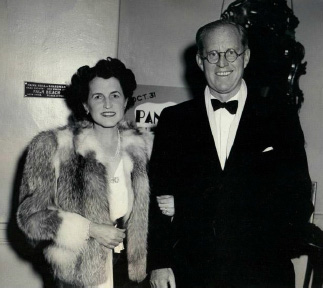
Ambassador and Mrs Kennedy, 1940
The main result of Jack’s European vacations was his final year thesis, which examined Britain’s policy of Appeasement in the face of Nazi aggression. This 148-page document, entitled Appeasement in Munich, was his most serious academic effort. Its objective was not to apportion blame for the failure of Appeasement, but rather to understand why Britain had found itself, once again, on the verge of war.
Meanwhile, debate raged at home about the relative merits of a possible US intervention in the worsening European conflict. Indeed, so topical was this issue, Appeasement in Munich was published as a book, called Why England Slept, in 1940. The publication posted impressive sales figures, selling more than 80,000 copies in the US and the UK. The success of his first foray into authorship highlighted, not for the last time, Jack’s ability to tap into the zeitgeist. And so, despite a lacklustre start to his college career, his profile was in the ascendancy by the time he graduated in 1940.
War Service
The interventionist debate was rendered immaterial following the Japanese attack on Pearl Harbour on 7 December 1941 – an act of aggression which forced the US to declare war on Japan the following day.
Despite its relatively late entry into World War Two, the US was not unprepared for combat. Conscription had been re-introduced in September 1940 and Jack Kennedy was among the first to be called up for the draft. Unlike his father, who had avoided enlisting during World War One, the younger Kennedy was keen to play his part. Whether this eagerness to serve was due to a genuine sense of patriotic duty or competitiveness with his older brother, who had volunteered for the navy, is debatable. Regardless, he was refused admission to both the army and navy after failing medical examinations and left bitterly disappointed.
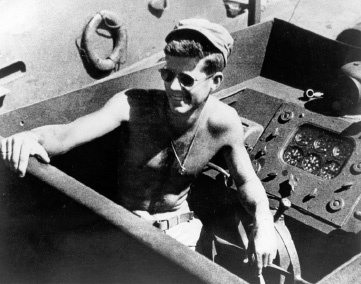
Kennedy aboard PT-109, 1943
Characteristically, the twenty-three-year-old refused to yield to this latest health-related setback and lobbied his father to intervene. Such was Joe Sr’s political influence that, in less than a month, his second son somehow managed to recover from his illness to be pronounced ‘physically qualified for appointment’ by a committee of medical examiners. In October 1941, Kennedy entered the United States Navy as a junior officer.
A brief stint in the Foreign Intelligence Branch of the Office of Naval Intelligence was brought to an abrupt end in early 1942 when Kennedy was transferred from Washington DC to Charleston Navy Yard in South Carolina. In March, his recurrent back pain became intolerable, forcing him to seek medical help from a number of specialists, none of whom could agree on a diagnosis. Disheartened by his persistent ailments and upset by the recent breakdown of his romantic relationship with a beautiful Danish reporter named Inga Arvad – at the time suspected of being a Nazi spy – Jack requested a deployment to sea.
Following an intensive sixty-day training course, he applied for the position of commander of a torpedo boat (also known as a Patrol Torpedo or PT), which were being used to attack Japanese ships in the Pacific. His back problems were initially expected to work against him, but again, some manoeuvrings by his father Joe Sr and his grandfather, Honey Fitz, navigated the problem. By March 1943, Lt Kennedy was posted to the Solomon Islands as commander of PT-109.
Behind Enemy Lines
Jack had never made any secret of his desire for front-line combat. This deployment to one of the central battlegrounds in the fierce fight for dominance in the Pacific would provide it.
On the night of 2 August PT-109 was on a routine patrol when it was rammed by a huge Japanese destroyer. Given the size differential, the small PT boat didn’t stand a chance – it was virtually sawn in half by the enemy ship, before bursting into flames. Lt Kennedy was at the helm at the time of collision, trying in vain to steer clear of the oncoming destroyer, and was flung violently against the wall by the force of the impact, badly injuring his already weak back.
He, however, was one of the lucky ones – of the twelve other crewmen on board, two lost their lives instantly. The remaining ten, along with Kennedy, were forced to abandon ship, plunged into the sea and had to cling to debris in order to remain afloat. Having sustained severe burns to his hands and face, one crewman, Patrick McMahon, struggled to reach the piece of floating hull that his comrades were using as a lifebuoy; Kennedy swam to the wounded man’s rescue and pulled him to safety.
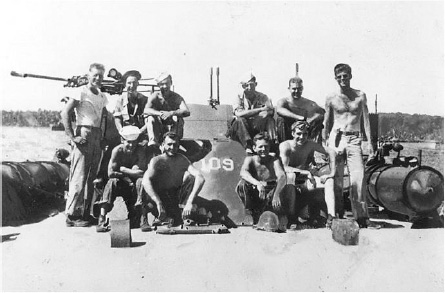
JFK (far right) and crewmen of PT-109
After nine hours in the water, the men reached a cluster of small islands which were situated a few miles away from the collision site, behind enemy lines. Ignoring his own back injury, Jack had pulled McMahon the whole way by clamping a strap of his life jacket between his teeth, while the wounded man floated on his back.
Having been discovered by natives who were sympathetic to their plight (and who may, in fact, have been Allied scouts), Jack arranged for a coconut shell to be smuggled to the nearest US naval base. The shell had inscribed on it the following message:
NAURO ISL…COMMANDER…NATIVE KNOWS POS’IT…HE CAN PILOT…11 ALIVE…NEED SMALL BOAT…KENNEDY.
The following morning, eight islanders arrived with food and water. They then concealed Kennedy under palm fronds and delivered him to Gamu, a nearby island where the local Allied coastwatcher could be found. From there, and with the help of the coastwatcher, Kennedy orchestrated the rescue of the rest of the crew, which was carried out under cover of darkness in the small hours of 8 August. The operation was a success. After six long days, the ordeal was over.
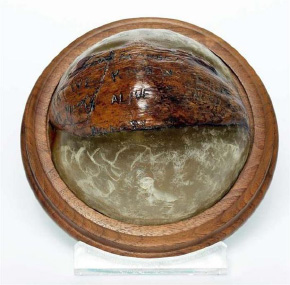
Coconut shell with distress message
Kennedy’s remarkable resourcefulness saved not only his own life but also the lives of his surviving ten crewmen. When news of his exploits reached US shores, he was lauded as a hero. In recognition of his bravery and leadership, he was awarded the Navy and Marine Corps Medal in June 1944, while the injuries to his back earned him the Purple Heart Medal.
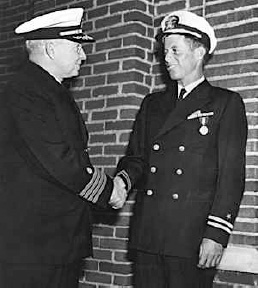
Receiving Navy and Marine Corps Medal from Captain Frederick Conklin
There was, however, another memento that Jack seemed to value more than anything else. Upon returning home, he had the life-saving coconut shell mounted on a wooden base and enshrined in a plastic dome. The resulting paperweight remained in his possession for the rest of his life, and when he became President, it took pride of place on his desk in the Oval Office.
Triumph to Tragedy
In keeping with their sibling rivalry, Joe Jr, in a letter dated 10 August, voiced his obvious scepticism. ‘Where the hell were you when the destroyer hove into sight,’ Joe Jr asked, ‘and exactly what were your moves, and where the hell was your radar?’ Suspecting that his brother was in some way culpable for the accident, Joe Jr became more intent than ever on outdoing his brother’s achievements. Joe Jr’s cynicism was also echoed in other quarters, with some suggesting that Kennedy could not have been paying attention to have allowed a destroyer to get so close. All such criticism was, however, drowned out by those extolling his courage and ingenuity during the subsequent rescue.
Having gained his wings in 1942, Joe Jr had spent much of the war in England, flying around the coastline on anti-submarine patrols. His attitude became increasingly reckless. Refusing to return home after flying thirty missions (which was his entitlement), Joe Jr chose instead to stay on, volunteering for ever more dangerous assignments – until finally his luck ran out.
On 12 August 1944, Lt Joseph Kennedy and his co-pilot, Lt Wilford John Willy, took to the air in a B-24 Liberator packed with 22,000 lbs of dynamite, the maximum amount of explosives that could be carried by a plane at the time. Their target, on the Belgian coast, was the launching site of the German V-1 flying bombs (Doodlebugs), which had been bombarding London since June. Their plan was to fly to 2,000 feet, activate the remote control system, arm explosives, and parachute from the aircraft. Joe Jr, no doubt aware that a number of previous attempts at such an attack had ended disastrously, reportedly asked a friend to ‘tell my Dad that I love him very much’, should he not come back.
Joe Jr didn’t come back. The explosives ignited not long after take-off, engulfing the plane in a ball of fire in the skies over South East England. Joe Jr’s body, and that of his co-pilot, were never recovered.

Lt Joseph Kennedy, Jr, 1942
The death of the eldest son left the Kennedys shaken. Aside from his grief, Jack was also greatly upset by the realization that his brother had now become idealized in his father’s eyes and thus a figure of impossibly high comparison. ‘I’m shadowboxing’, he said, ‘in a match the shadow is always going to win.’
Passing the Baton
No longer able to hide the extent of his medical problems – which, by this stage, ranged from stomach problems, intestinal problems including spastic colitis, incessant back pain, weight loss, and jaundicing of the skin – Kennedy was discharged from the navy on medical grounds in March 1945.
He now tried his hand at journalism, writing a number of articles as he recuperated from back surgery. One particular piece, in which he called on the US to avoid entering an arms race with the Soviet Union brought him to the attention of the newspaper magnate, Randolph Hearst. As soon as Kennedy regained his strength, Hearst despatched the 28-year-old to San Francisco to cover the United Nations conference. In all, he wrote seventeen short pieces – often highlighting the growing tensions between the West and the USSR – which were published in the Chicago Herald-American. But instead of establishing a journalistic career, Kennedy’s experience at the UN conference whetted his appetite for post-war international politics.
But if he harboured any doubts about his future direction, his father soon dispelled them. It was no secret that Joe Sr had long held ambitious plans to establish his family as a political force, and now, in the stead of his favoured eldest son, he encouraged Jack to fulfil these hopes.
But it would not be easy. ‘He [Joe Jr] was altogether different from Jack,’ the Kennedy patriarch once said. ‘[Joe Jr was] more dynamic, more sociable, more easy-going. Jack […] was rather shy, withdrawn and quiet. His mother and I couldn’t picture him as a politician.’ Nevertheless, Joe Sr persevered, telling a reporter in 1957:
I got Jack into politics. I was the one. I told him Joe was dead and that it was therefore his responsibility to run for Congress. He didn’t want to do it. He felt he didn’t have the ability and he still feels that way. But I told him he had to do it.
For his part, Jack likened the onslaught from his father in loaded terms. ‘It was like being drafted’, he said, ‘my father wanted his eldest son in politics. “Wanted” isn’t the right word. He demanded it.’ Initially, he rebelled instinctively and resisted the pressure. ‘Dad is ready right now,’ he said to a friend, ‘and can’t understand why Johnny boy isn’t all engines ahead full.’



